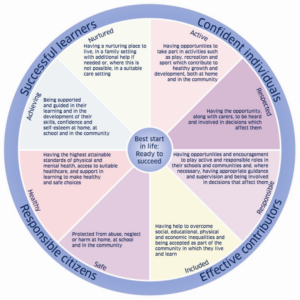At St. Leonard’s Primary School, we use the Nurture Principles to enable children to develop socially and emotionally throughout all aspects of their learning. Nurture principles are based on Attachment Theory – the idea that developing positive relationships with family, peers and other adults from an early age facilitates healthy development. Nurture practices aim to give children the social and emotional skills to do well at school and with peers to develop their resilience. In class children learn about their feelings using the Emotion Works programme, developing their skills for identifying and managing the wide range of emotions we feel in life.

Research clearly demonstrates the impact that Nurture can have on attainment as well as social and emotional competences. At the heart of Nurture is a focus on wellbeing and relationships and a drive to support the growth and development of children and young people. A Nurturing approach has been promoted as a key approach to supporting behaviour, wellbeing, attainment, and achievement in our school.
Six important principles underpin our approach to Nurture
- 1. Children’s learning is understood developmentally – the foundation of learning begins at birth and develops through relationships with adults in their life. Social empathy as well as learning develops from being thought about, valued, and encouraged. Staff in school respond to each child at the most appropriate emotional or social level.
- School offers a safe base – there is a structure to the day, which is predictable. Adults who are caring and understanding set boundaries without being punitive. Children see adults working together and supporting each other. This provides security and reassurance. Our Nurture Hub offers a place where children can talk with a trusted adult or can be a place to explore sensory resources to support regulation.
- The importance of nurture for the development of wellbeing – nurture is listening, being responsive, remembering and engaging in reciprocal, shared activities such as play, having a meal together, reading, learning, talking about events and feelings. Children respond to being valued and being thought of as individuals. Staff notice and praise every small achievement.
- Language is understood as a vital means of communication – Language is more than a skill to be learnt, it is the way of putting feelings into words. Children often ‘act out’ their feelings as they lack the vocabulary to ‘name’ how they feel. In nurture groups the informal opportunities for talking and sharing, e.g. welcoming the children into the group or having breakfast together are as important as the more formal lessons teaching language skills. Words are used instead of actions to express feelings and opportunities are created for extended conversations or encouraging imaginative play to understand the feelings of others. Restorative conversations support children who have come into conflict and helps them to identify ways to manage their emotions.
- All behaviour is communication –Understanding what a child is communicating through behaviour helps staff to respond appropriately. If the child can sense their feelings are understood this can help to diffuse challenging situations. This principle underlines the adult response to the children’s often challenging or difficult behaviour. ‘Given what I know about this child and their development what is this child trying to tell me?.’
- Transitions are significant in the lives of children – On a daily basis there are numerous transitions the child makes, e.g. between sessions and classes and between different adults. Changes in routine are invariably difficult for vulnerable children and need to be carefully managed with preparation and support. Class teachers will inform children of changes in advance, and these will be communicated on SeeSaw when possible. Visuals are used in class to help children understand plans for the day.
Children who may benefit from attending Nurture groups are identified using 8 wellbeing indicators. Teachers, support staff and other adults who work with our children may identify areas of wellbeing that are not currently being met and will plan with the Headteacher and Principal Teacher to identify appropriate supports. These supports may be in class, as part of nurture groups or working one to one.

Nurture Groups
At St Leonard’s we have a number of groups to support children’s wellbeing. Nurture groups offer a short term, focused intervention which addresses barriers to learning arising from social, emotional, or behavioural difficulties, in an inclusive, supportive manner. Children and young people continue to remain part of their own class group. Groups are normally held in our Nurture Hub.
Nurture groups may include:
- Kitbag
- Meditation and relaxation
- Life skills and Wider Achievement
- Neurodiversity groups
- TLG Coaching.
